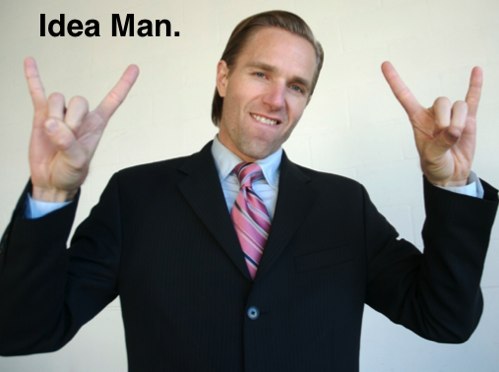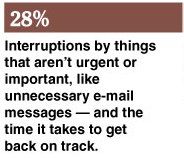Merlin’s weekly podcast with Dan Benjamin. We talk about creativity, independence, and making things you love.
CommentaryDeciding Whether to Read a Book: Some Wildly Reductive HeuristicsMerlin Mann | Aug 27 2008
On the off chance that you care or find it useful in developing your own filtering, here's my insanely reductive, mean-busy-guy way to make a 90-second decision on whether to read a new non-fiction book from an author I'm not familiar with. It does not matter whether you agree with these; that's how you know they're personal heuristics. Also, they are almost uniformly unfair and unkind. So. read more »POSTED IN:
Social Networks: The Case for a "Pause" ButtonMerlin Mann | Aug 26 2008
As duplicitous and sad as "fake following" sounds -- and let's be honest: the whole idea's pathetic on a number of levels -- for a certain kind of user, I can see why there's a desire for this functionality. Especially on a site like FriendFeed, which has quickly become the platform of choice for the web's least interesting narcissists -- and the slow-witted woodland creatures who enjoy grooming their fur -- this is a major breakthrough in the makebelieve friendship space. Yes, primate culture may be primitive, but it is not without its evolving needs. Thing is, "fake following" is also not so far off from a more wholesome feature that I've been begging for on social networks for years now: Any application that lets you "friend," "follow," or otherwise observe another user should include a prominent (and silent) "PAUSE" button. read more »POSTED IN:
What Makes for a Good Blog?Merlin Mann | Aug 19 2008My friends at Six Apart recently asked me to make a list of blogs that I enjoy. I think they're planning to use it for their new Blogs.com project. Unfortunately, I'm late getting it to them (typical), but if it's still useful, I'll post it here in a day or four. As I think about the blogs I've returned to over the years -- and the increasingly few new ones that really grab my attention -- I want to start with, ironically enough, a list. Here's what I think helps make for a good blog. read more »POSTED IN:
Ideas, Execution, and the Rare AuteurMerlin Mann | Aug 11 2008ideas are just a multiplier of execution - O'Reilly ONLamp Blog Derek Sivers' short blog post from 2005 has been making the rounds lately -- it came to me via Chairman Gruber -- and I have to say, I can't stop thinking about it. I think this is really profound thinking around the fundamental misunderstanding many people have about the value of ideas. In a nutshell, Derek says ideas are valuable only inasmuch as they can be multiplied by execution. So, if you remember your 3rd grade arithmetic, you can figure out the product of even the most fantastic idea when it's multiplied by zero execution. I, too, frequently encounter this attitude of "Sign the NDA! Sign the NDA!" any time someone wants to tell me about their squirrelly idea for making a bajillion dollars on the internet, and I almost always end up saying the same six things to The Idea Men: read more »POSTED IN:
Blog Pimping, or: Who Do You Want to Delight?Merlin Mann | Jul 21 2008My favorite bloggers are great at articulating something I feel in my gut -- but they regularly present it better, more clearly, and (on days like today), more succinctly than I ever could. Such is the case with Jack Shedd's post, "Tacky," a razor-sharp polemic on the industry of cheese-food manufacturing that "pro blogging" has turned into.
For myself, I think there's nothing wrong with having a blog and wanting to make money with it. Obviously. But I also hold an increasingly old-fashioned view that you ought to start with something you're passionate about sharing with people -- something besides how to make easy money with a blog -- and try to build an audience of people you respect based on producing work you're happy with or even proud of. read more »15 Comments
POSTED IN:
NYT: Businesses Fight the Email Monster They Helped CreateMerlin Mann | Jun 14 2008Lost in E-Mail, Tech Firms Face Self-Made Beast - NYTimes.com Is Information Overload a Billion Drag on the Economy? - Bits - Technology - New York Times Blog If you've seen the video of my Inbox Zero talk at Google, you may recall the moment when a few attendees start mentioning the hundreds of internal email messages they receive (and send) in a given day. I still remember, because I almost fainted. Whenever I hear these and similar stories, the same question always comes to mind: "What does a company get out of its employees spending half their day using an email program?" Well, apparently, it's a question a lot of people are starting to ask. Including Google. read more »POSTED IN:
Email Insanity & the 0.001 ChallengeMerlin Mann | Apr 24 2008Via a Toot by Jeff Atwood comes this thoughtful post by Tantek Çelik on how email is no longer working for him. His first reason is a biggie:
This is one reason I'm getting attracted to using Get Satisfaction as a way to expose help issues to a large group of helpers and helpees (BTW, we're just getting started on GS -- FAQs and more will be coming soon). I'm also realizing that this is why I (and Jonathan Coulton and probably you) struggle with holding up dozens of one-on-one conversations -- it locks up your attention and its fruits in thousands of inaccessible alcoves. And truly, that does not and will not scale. But, y'know, as I read Tantek's post, alongside his "Communication Protocols" notes, I found myself returning to a pet theory that I've been too embarrassed to lay out in a real post. But what the heck, I'll capture some notes and you can tell me what you think: I suspect that email encourages people to act insane. read more »POSTED IN:
A Day Unplugged: Frenzied Blackberries vs. Kwai Chang Caine?Merlin Mann | Mar 3 2008I Need a Virtual Break. No, Really. - New York Times In yesterday's New York Times, Mark Bittman wrote an entertaining and thoughtful article about realizing that his need to stay wired, in-touch, and updated was really starting to eat into him. His headslap moment came on an international flight, as he realizes "the only other place I could escape was in my sleep." He goes on to talk about the difficulty of maintaining even a single day of "Sabbath" from electronic communication and media:
But, eventually, he settles in and starts to enjoy things that would never appear on his radar screen on a wired day:
Eventually (natch), he returns to the wired world. So it goes. I liked that this piece was written from a personal perspective, which, to my mind, is the best (and, often, only) place to start any kind of experiment around hacking time and attention. And, I do really like the idea of periodically accepting (enforcing?) days without media and wires. Truly, you'll never realize how difficult this can be until you really make it happen. But, as Bittman notes, once you get over the initial crash, you can see a striking contrast in what your life could look like. Good stuff. But, like a lot of pieces on wired overstimulation, this one comes close to conflating the axis of "work" with the axis of "electronic media." Which, in my opinion, is an unwholesome confusion to abide, even just in appearance -- especially since it could be seen as blaming inert matter for our problems, while allowing us addicts (and the culture we've permitted ourselves to grow accustomed to) to get off way too easy. read more »POSTED IN:
The Economy of the HeartJoel Johnson | Jan 28 2008I’m not a Christian anymore. Perhaps I got a raw deal when God was passing out churches—mine was shaken apart in my late teens by a pastor who got busted for sneaking a few hundred thousand out of the offering plate to buy Nazi war memorabilia, not to mention banging a few dozen women who came to him for marriage counseling—but I’ve made my peace with the Prince of it. One particularly Christian principle has apparently stuck with me over the years. It wasn’t until recently that I rediscovered it. (Not animal sacrifice, which I never abandoned.) And whether Jesus of Nazareth existed as a real meat person or was the product of a coterie of desert sci-fi novelists, one thing he taught has been helping me a lot lately. It’s awfully nice to forgive. read more »POSTED IN:
.Mac: Future of a sleeping giant?Merlin Mann | Jan 18 2008My tall, new friend Scott McNulty interviewed me yesterday for TUAW's Macworld coverage -- unintentionally providing me a fine bully pulpit from which to perpetuate my baseless theories and half-baked forecasts about how Apple might eat the lunches of about three different industries over the next couple years. If they can pull it off, if they can fix .Mac, and if they have the vision to re-imagine themselves as the company who makes your entire digital world safe, fun, ubiquitous, and flawlessly integrated. Anyhow, on with the motley, but stay tuned after the jump for value-added hand-waving. So, exactly what the hell nonsense am I talking about here? read more »POSTED IN:
|
|
| EXPLORE 43Folders | THE GOOD STUFF |






